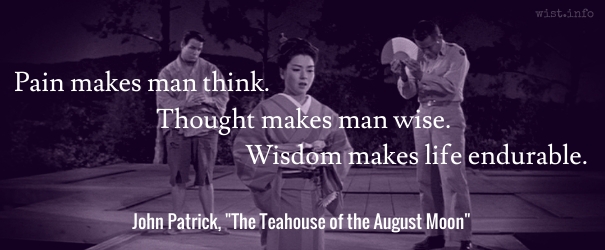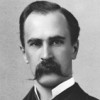Quotations about:
suffering
Note not all quotations have been tagged, so Search may find additional quotes on this topic.
When we honestly ask ourselves which person in our lives mean the most to us, we often find that it is those who, instead of giving advice, solutions, or cures, have chosen rather to share our pain and touch our wounds with a warm and tender hand. The friend who can be silent with us in a moment of despair or confusion, who can stay with us in an hour of grief and bereavement, who can tolerate not knowing, not curing, not healing and face with us the reality of our powerlessness, that is a friend who cares.
The history of the Jews also shows that oppression and persecution are far more efficacious in binding a nation together than community of interest and national prosperity. Increase of wealth divides rather than unites a people; but suffering shared in common binds it together with hoops of steel.
The more you try to avoid suffering, the more you suffer, because smaller and more insignificant things begin to torture you, in proportion to your fear of being hurt. The one who does most to avoid suffering is, in the end, the one who suffers most.
One must, in one’s life, make a choice between boredom and suffering.
Germaine de Staël (1766-1817) Swiss-French writer, woman of letters, critic, salonist [Anne Louise Germaine de Staël-Holstein, Madame de Staël, Madame Necker]
Letter to Claude Hochet (Summer 1800)
Quoted in J. Christopher Herold, Mistress to an Age: A Life of Madame de Staël (1958). Herold added, "Her decision was emphatically in favor of suffering, which after all was a pleasure compared to boredom."
When evil-doing comes like falling rain, nobody calls out “stop!”
When crimes begin to pile up they become invisible.
When sufferings become unendurable the cries are no longer heard.
The cries, too, fall like rain in summer.
For all my rational Western intellect and education, I was for the moment overwhelmed by a primitive sense of living in a world ordered by a malign and perverted god, and it coloured my view of everything that afternoon — even the coconuts. The villagers sold us some and split them open for us. They are almost perfectly designed. You first make a hole and drink the milk, and then you split open the nut with a machete and slice off a segment of the shell, which forms a perfect implement for scooping out the coconut flesh inside. What makes you wonder about the nature of this god character is that he creates something that is so perfectly designed to be of benefit to human beings and then hangs it twenty feet above their heads on a tree with no branches.
I believe that the present suffering is nothing compared to the coming glory that is going to be revealed to us. The whole creation waits breathless with anticipation for the revelation of God’s sons and daughters. Creation was subjected to frustration, not by its own choice — it was the choice of the one who subjected it — but in the hope that the creation itself will be set free from slavery to decay and brought into the glorious freedom of God’s children. We know that the whole creation is groaning together and suffering labor pains up until now. And it’s not only the creation. We ourselves who have the Spirit as the first crop of the harvest also groan inside as we wait to be adopted and for our bodies to be set free. We were saved in hope. If we see what we hope for, that isn’t hope. Who hopes for what they already see? But if we hope for what we don’t see, we wait for it with patience.
There is such a thing as internal collapse. Despairing certitude does not infiltrate a human being without displacing and disrupting certain profound elements that sometimes constitute the man himself. Grief, when it reaches this pitch, routs all strength of conscience. These are deadly crises. Few of us emerge from them true to ourselves and steadfast in our duty. When the limit of endurance is exceeded, the most unshakeable virtue is undermined.
[Il y a des effondrements intérieurs. La pénétration d’une certitude désespérante dans l’homme ne se fait point sans écarter et rompre de certains éléments profonds qui sont quelquefois l’homme lui-même. La douleur, quand elle arrive à ce degré, est un sauve-qui-peut de toutes les forces de la conscience. Ce sont là des crises fatales. Peu d’entre nous en sortent semblables à eux-mêmes et fermes dans le devoir. Quand la limite de la souffrance est débordée, la vertu la plus imperturbable se déconcerte.]
Victor Hugo (1802-1885) French writer
Les Misérables, Part 4 “Saint Denis,” Book 15 “The Rue de L’Homme Armé,” ch. 1 (4.15.1) (1862) [tr. Donougher (2013)]
(Source)
Valjean "internally collapsing" at the realization that Cosette plans to leave him for Marius, and deciding to track Marius down to confront or even kill him.
(Source (French)). Alternate translations:
There are interior subsoilings. The penetration of a torturing certainty into man does not occur without breaking up and pulverising certain deep elements which are sometimes the man himself. Grief, when it reaches this stage, is a panic of all the forces of the soul. These are fatal crises. Few among us come through them without change, and firm in duty. When the limit of suffering is overpassed, the most imperturbable virtue is disconcerted.
[tr. Wilbour (1862)]
There are such things as internal landslides; the penetration of a desperate certainty into a man is not effected without removing and breaking certain profound elements which are at times the man himself. Grief, when it attains that pitch, is a frantic flight of all the forces of the conscience, and such crises are fatal Few among us emerge from them equal to ourselves and firm in our duty, for when the limit of suffering is exceeded the most imperturbable virtue is disconcerted.
[tr. Wraxall (1862)]
There is such a thing as the sudden giving way of the inward subsoil. A despairing certainty does not make its way into a man without thrusting aside and breaking certain profound elements which, in some cases, are the very man himself. Grief, when it attains this shape, is a headlong flight of all the forces of the conscience. These are fatal crises. Few among us emerge from them still like ourselves and firm in duty. When the limit of endurance is overstepped, the most imperturbable virtue is disconcerted.
[tr. Hapgood (1887)]
There is such a thing as spiritual collapse. The thrust of a desperate certainty into a man cannot occur without the disruption of certain profound elements which are sometimes the man himself. Anguish, when it has reached this stage, becomes a panic-flight of all the powers of conscience. There are mortal crises from which few of us emerge in our right mind, with our sense of duty still intact. When the limit of suffering is overpassed the most impregnable virtue is plunged in disarray.
[tr. Denny (1976)]
There are interior collapses. The penetration of a torturing certainty within man does not occur without breaking up and pulverizing certain deep elements that are sometimes the man himself. Grief, when it reaches this level, is a panic of all the forces of consciousness. These are fatal crises. Few among us come through them unchanged and firm in duty. When the limit of suffering is topped, the most imperturbable virtue is disconcerted.
[tr. Wilbour/Fahnestock/MacAfee (1987)]
Pain is a byproduct of life. That’s the truth. Life sometimes sucks. That’s true for everyone. But if you don’t face the pain and the suck, you don’t ever get the other things either. Laughter. Joy. Love. Pain passes, but those things are worth fighting for. Worth dying for.
Jim Butcher (b. 1971) American author
(Attributed)
Often cited to the short story "Vignette" (also known as "Publicity and Advertising"), but not found there.
Oh, if there is a man out of hell that suffers more than I do, I pity him.
Suffering cleanses only when it is free of resentment. Wholehearted contempt for our tormentors safeguards our soul from the mutilations of bitterness and hatred.
Eric Hoffer (1902-1983) American writer, philosopher, longshoreman
The Passionate State of Mind, Aphorism 263 (1955)
(Source)
If Afflictions refine some, they consume others.
Thomas Fuller (1654-1734) English physician, preacher, aphorist, writer
Gnomologia: Adages and Proverbs, #2666 (1732)
(Source)
Things cannot always go your way. Learn to accept in silence the minor aggravations, cultivate the gift of taciturnity and consume your own smoke with an extra draught of hard work, so that those about you may not be annoyed with the dust and soot of your complaints.
Something about the fact that I made some contribution to either my country, or those who were less well off. I think back to what Camus wrote about the fact that perhaps this world is a world in which children suffer, but we can lessen the number of suffering children, and if you do not do this, then who will do this? I’d like to feel that I’d done something to lessen that suffering.
Robert Francis Kennedy (1925-1968) American politician
Interview with David Frost (1968)
In an interview a month before he was assassinated, about how his obituary should read. See Camus.
Prudence, indeed, will dictate that Governments long established should not be changed for light and transient causes; and accordingly all experience hath shewn, that mankind are more disposed to suffer, while evils are sufferable, than to right themselves by abolishing the forms to which they are accustomed. But when a long train of abuses and usurpations, pursuing invariably the same Object evinces a design to reduce them under absolute Despotism, it is their right, it is their duty, to throw off such Government, and to provide new Guards for their future security.
Thomas Jefferson (1743-1826) American political philosopher, polymath, statesman, US President (1801-09)
“Declaration of Independence” (4 Jul 1776)
(Source)
As modified and approved by the Continental Congress. Jefferson's "original rough draft" is very similar:
Prudence indeed will dictate that governments long established should not be changed for light & transient causes: and accordingly all experience hath shewn that mankind are more disposed to suffer while evils are sufferable, than to right themselves by abolishing the forms to which they are accustomed. but when a long train of abuses & usurpations, begun at a distinguished period, & pursuing invariably the same object, evinces a design to subject them to arbitrary power, it is their right, it is their duty, to throw off such government & to provide new guards for their future security.
Troubles forereckoned are doubly suffered.
Christian Nestell Bovee (1820-1904) American epigrammatist, writer, publisher
(Attributed)
(Source)
Quoted in Orison Swett Marden, The Secret of Achievement (1898).
The question is not, Can they reason? nor, Can they talk? but, Can they suffer?
Jeremy Bentham (1748-1832) English jurist and philosopher
An Introduction to the Principles of Morals and Legislation, ch. 17, sec. 1, footnote (1789)
(Source)
On animals, questioning why they are treated differently under the law.
People who suffer as I do from nervous complaints can have no great inclination for talking. Nobody can tell what I suffer! — But it is always so. Those who do not complain are never pitied.
O poor mortals, how ye make this Earth bitter for each other; this fearful and wonderful Life fearful and horrible; and Satan has his place in all hearts! Such agonies and ragings and wailings ye have, and have had, in all times: — to be buried all, in so deep silence; and the salt sea is not swoln with your tears.
Thomas Carlyle (1795-1881) Scottish essayist and historian
The French Revolution: A History, Part 1, Book 5, ch. 5 (1.5.5) (1837)
(Source)
As the prospect of violence mounts within Paris on the night of 13 July 1789. The next day was the storming of the Bastille.
You read something which you thought only happened to you, and you discover that it happened 100 years ago to Dostoyevsky. This is a very great liberation for the suffering, struggling person, who always thinks that he is alone. This is why art is important. Art would not be important if life were not important, and life is important.
James Baldwin (1924-1987) American novelist, playwright, activist
“An interview with James Baldwin” by Studs Terkel (1961), in Conversations With James Baldwin (1989)
(Source)
Baldwin revisited this theme multiple times.
You think your pain and your heartbreak are unprecedented in the history of the world, but then you read. It was Dostoevsky and Dickens who taught me that the things that tormented me most were the very things that connected me with all the people who were alive, or who had ever been alive. Only if we face these open wounds in ourselves can we understand them in other people. An artist is a sort of emotional or spiritual historian.
[Interview with Jane Howard, Life Magazine (24 May 1963)]
You think your pain and your heartbreak are unprecedented in the history of the world, but then you read. It was books that taught me that the things that tormented me most were the very things that connected me with all the people who were alive, or who had ever been alive.
["James Baldwin Recalls His Childhood," quoting from a television program, New York Times (31 May 1964)]
Have not many of us, in the weary way of life, felt, in some hours, how far easier it were to die than to live?
The martyr, when faced even by a death of bodily anguish and horror, finds in the very terror of his doom a strong stimulant and tonic. There is a vivid excitement, a thrill and fervor, which may carry through any crisis of suffering that is the birth-hour of eternal glory and rest.
But to live, — to wear on, day after day, of mean, bitter, low, harassing servitude, every nerve dampened and depressed, every power of feeling gradually smothered, — this long and wasting heart-martyrdom, this slow, daily bleeding away of the inward life, drop by drop, hour after hour, — this is the true searching test of what there may be in man or woman.
Harriet Beecher Stowe (1811-1896) American author
Uncle Tom’s Cabin, ch. 38 “The Victory” (1852)
(Source)
Any mind that is capable of a real sorrow is capable of good.
Harriet Beecher Stowe (1811-1896) American author
Uncle Tom’s Cabin, ch. 28 “Reunion” (1852)
(Source)
O stranger, cease thy care;
Wise is the soul, but man is born to bear;
Jove weighs affairs of earth in dubious scales,
And the good suffers, while the bad prevails.
Bear, with a soul resign’d, the will of Jove;
Who breathes, must mourn: thy woes are from above.[‘ξεῖν᾽, ἐπεὶ οὔτε κακῷ οὔτ᾽ ἄφρονι φωτὶ ἔοικας:
Ζεὺς δ᾽ αὐτὸς νέμει ὄλβον Ὀλύμπιος ἀνθρώποισιν,
ἐσθλοῖς ἠδὲ κακοῖσιν, ὅπως ἐθέλῃσιν, ἑκάστῳ:
καί που σοὶ τάδ᾽ ἔδωκε, σὲ δὲ χρὴ τετλάμεν ἔμπης.]Homer (fl. 7th-8th C. BC) Greek author
The Odyssey [Ὀδύσσεια], Book 6, l. 187ff (6.187-190) (c. 700 BC) [tr. Pope (1725), l. 227ff]
(Source)
(Source (Greek)). Alternate translations:
Stranger! I discern in thee
Nor sloth, nor folly, reigns; and yet I see
Th’ art poor and wretched. In which I conclude,
That industry nor wisdom make endued
Men with those gifts that make them best to th’ eye;
Jove only orders man’s felicity.
To good and bad his pleasure fashions still
The whole proportion of their good and ill.
And he, perhaps, hath form’d this plight in thee,
Of which thou must be patient, as he free.
[tr. Chapman (1616)]
You seem to be a good man and discreet,
But Jove on good and bad such fortune lays,v Happy or otherwise, as he thinks meet;
And since distress is fallen to your share,
You must contented be to suffer it.
[tr. Hobbes (1675), l. 178ff]
Since, stranger! neither base by birth thou seem’st,
Nor unintelligent, (but Jove, the King
Olympian, gives to good and bad alike
Prosperity according to his will,
And grief to thee, which thou must patient bear,)
[tr. Cowper (1792), l. 233ff]
Stranger, who seemest neither vile nor vain,
Zeus both to good and evil doth divide
Wealth as he listeth. He perchance this pain
Appointed; thou thy sorrow must sustain.
[tr. Worsley (1861), st. 25]
Nor vice, nor folly marks thee -- and great Jove
In high Olympus thron'd doth this world's good
To men mete out, the wicked and the just,
E'en as to Him seems best: and this thy lot
He haply hath assign'd;' and 'tis for thee
With patient soul to bear it.
[tr. Musgrave (1869), l. 289ff]
Sir guest! since thou no sorry wight dost seem;
And Zeus himself from Olympus deals out weal
To the good and band: -- to each as it pleaseth him:
And somehow he hath sent these things to thee;
So it becomes thee to endure them wholly.
[tr. Bigge-Wither (1869)]
Stranger, forasmuch as thou seemest no evil man nor foolish -- and it is Olympian Zeus himself that giveth weal to men, to the good and to the evil, to each one as he will, and this thy lot doubtless is of him, and so thou must in anywise endure it.
[tr. Butcher/Lang (1879)]
O guest, forsooth thou seemest no fool, and no man of ill.
But Zeus the Olympian giveth to menfolk after his will,
To each, be he good, be he evil, his share of the happy day;
And these things shall be of his giving; so bear it as ye may.
[tr. Morris (1887)]
Stranger, because you do not seem a common, senseless person, -- and Olympian Zeus himself distributes fortune to mankind and gives to high and low even as he wills to each; and this he gave to you, and you must bear it therefore.
[tr. Palmer (1891)]
Stranger, you appear to be a sensible, well-disposed person. There is no accounting for luck; Zeus gives prosperity to rich and poor just as he chooses, so you must take what he has seen fit to send you, and make the best of it.
[tr. Butler (1898), rev. Power/Nagy]
Stranger, since thou seemest to be neither an evil man nor a witless, and it is Zeus himself, the Olympian, that gives happy fortune to men, both to the good and the evil, to each man as he will; so to thee, I ween, he has given this lot, and thou must in any case endure it.
[tr. Murray (1919)]
Stranger -- for to me you seem no bad or thoughtless man -- it is Zeus himself who assigns bliss to men, to the good adn to the evil as he wills, to each his lot. Wherefore surely he gave you this unhappiness, and you must bear it.
[tr. Lawrence (1932)]
"Sir," said the white-armed Nausicaa, "your manners prove that you are no rascal and no fool; and as for these ordeals of yours, they must have been sent you by Olympian Zeus, who follows his own will in dispensing happiness to people whatever their merits. You have no choice but to endure."
[tr. Rieu (1946)]
Stranger, there is no quirk or evil in you
that I can see. You know Zeus metes out fortune
to good and bad men as it pleases him.
Hardship he sent to you, and you must bear it.
[tr. Fitzgerald (1961)]
My friend, since you seem not like a thoughtless man, nor a mean one,
it is Zeus himself, the Olympian, who gives people good fortune,
to each single man, to the good and the bad, just as he wishes;
and since he must have given you yours, you must even endure it.
[tr. Lattimore (1965)]
You, stranger, since you do not seem to be
mad or malicious, know that only he --
Olympian Zeus -- allots felicity
to men, to both the noble and the base,
just as he wills. To you he gave this fate
and you must suffer it -- in any case.
[tr. Mandelbaum (1990)]
"Stranger," the white-armed princess answered staunchly,
"friend, you're hardly a wicked man, and no fool, I'd say --
it's Olympian Zeus himself who hands our fortunes out,
to each of us in turn, to the good and bad,
however Zeus prefers ...
He gave you pain, it seems. You simply have to bear it.
[tr. Fagles (1996)]
"Stranger, you do not seem to be a bad man
Or a fool. Zeus himself, the Olympian god,
Sends happiness to good men and bad men both,
To each as he wills. To you he has given these troubles,
Which you have no choice but to bear.
[tr. Lombardo (2000), l. 191ff]
Stranger -- because you seem neither base nor without understanding
Zeus himself, the Olympian, gives out fortune to mankind,
both to the base and the noble, to each one just as he wishes;
so he has given you this, yet nevertheless you must bear it.
[tr. Merrill (2002)]
Since your manners show you are not a bad man or a fool -- it is Olympian Zeus himself who assigns good fortune to men, good and bad alike, as he wills, and must have sent you your personal misfortune -- and you must just endure it.
[tr. DCH Rieu (2002)]
Stranger, you do not strike me as either a rogue or a fool. It is Olympian Zeus himself who dispenses prosperity to men, to both good and bad, to each as he wishes; he must surely have sent you these troubles, and you must bear them as you may.
[tr. Verity (2016)]
Well, stranger, you seem a brave and clever man; you know that Zeus apportions happiness to people, to good and bad, each one as he decides. your troubles come from him, and you must bear them.
[tr. Wilson (2017)]
Stranger, you seem neither malicious nor witless: but it's Zeus, the Olympian in person, who bestows good fortune on men, the good and the bad, to each as he wills; I suppose he chose this lot for you, and you just have to bear it.
[tr. Green (2018)]
Stranger, you don’t seem to be a wicked man,
or foolish. Olympian Zeus himself
gives happiness to bad and worthy men,
each one receiving just what Zeus desires.
So he has given you your share, I think.
Nonetheless, you must still endure your lot.
[tr. Johnston (2019), l. 241ff]
HAMLET:Who would fardels bear,
To grunt and sweat under a weary life,
But that the dread of something after death,
The undiscovered country from whose bourn
No traveler returns, puzzles the will
And makes us rather bear those ills we have
Than fly to others that we know not of?William Shakespeare (1564-1616) English dramatist and poet
Hamlet, Act 3, sc. 1, l. 84ff (3.1.84-90) (c. 1600)
(Source)
"Fardels" = "burdens"
I swore to never be silent whenever and wherever human beings endure suffering and humiliation. We must always take sides. Neutrality helps the oppressor, never the victim; silence encourages the tormentor, never the tormented.
Elie Wiesel (1928-2016) Romanian-American novelist, professor, political activist, Nobel Laureate.
Nobel Peace Prize acceptance speech (10 Dec 1986)
(Source)
We are constantly railing against the passions; we ascribe to them all of man’s afflictions, and we forget that they are also the source of all his pleasures.
Zeus, who guided mortals to be wise,
has established his fixed law —
wisdom comes through suffering.
Trouble, with its memories of pain,
drips in our hearts as we try to sleep,
so men against their will
learn to practice moderation.
Favours come to us from gods
seated on their solemn thrones —
such grace is harsh and violent.τὸν φρονεῖν βροτοὺς ὁδώ-
σαντα, τὸν [πάθει μάθος]
θέντα κυρίως ἔχειν.
στάζει δ’ ἀνθ’ ὕπνου πρὸ καρδίας
μνησιπήμων πόνος· καὶ παρ’ ἄ-
κοντας ἦλθε σωφρονεῖν.
δαιμόνων δέ που χάρις βίαιος
σέλμα σεμνὸν ἡμένων.Aeschylus (525-456 BC) Greek dramatist (Æschylus)
Agamemnon, ll. 175-183 [tr. Johnston (2007)]
(Source)
Alt. trans.:The first Hamilton alternate was used, slightly modified, by Robert Kennedy in his speech on the assassination of Martin Luther King, Jr. (4 Apr 1968). Kennedy's family used it as an epitaph on his grave Arlington National Cemetery: "Even in our sleep, pain which cannot forget, falls drop by drop upon the heart, until in our own despair, against our will, comes wisdom, through the awful grace of God."
- "It is through suffering that learning comes." [In Arnold Toynbee, "Christianity and Civilization" (1947), Civilization on Trial (1948)]
- "God, whose law it is that he who learns must suffer. And even in our sleep pain that cannot forget, falls drop by drop upon the heart, and in our own despite, against our will, comes wisdom to us by the awful grace of God." [tr. Hamilton (1930)]
- "Guide of mortal man to wisdom, he who has ordained a law, knowledge won through suffering. Drop, drop -- in our sleep, upon the heart sorrow falls, memory’s pain, and to us, though against our very will, even in our own despite, comes wisdom by the awful grace of God." [tr. Hamilton (1937)]
See here for more discussion.
Life […] is really a constant suffering, or, at any rate, […] a business that does not cover the costs.
[Da das Leben […] eigentlich ein stetes Leiden, oder wenigstens, […] ein Geschäft ist, welches die Kosten nicht deckt.]
Arthur Schopenhauer (1788-1860) German philosopher
Die Welt als Wille und Vorstellung [The World as Will and Representation], Vol. 2, ch. 19 “Vom Primat des Willens im Selbstbewußtseyn [On the primacy of the Will in Self-Consciousness],” § 11 (1844 ed.) [tr. Payne (1958)]
(Source)
(Source (German)). Usually paraphrased: "Life is a business that does not cover the costs."
The dead do not suffer. And if they live again, their lives will surely be as good as ours. We have no fear. We are all children of the same mother, and the same fate awaits us all. We, too, have our religion, and it is this: Help for the living, hope for the dead.
Robert Green Ingersoll (1833-1899) American lawyer, agnostic, orator
“At a Child’s Grave” (8 Jan 1882)
(Source)
When you have prayed for victory you have prayed for many unmentioned results which follow victory — must follow it, cannot help but follow it. Upon the listening spirit of God the Father fell also the unspoken part of the prayer. He commandeth me to put it into words. Listen!
“O Lord our Father, our young patriots, idols of our hearts, go forth to battle — be Thou near them! With them — in spirit — we also go forth from the sweet peace of our beloved firesides to smite the foe. O Lord our God, help us to tear their soldiers to bloody shreds with our shells; help us to cover their smiling fields with the pale forms of their patriot dead; help us to drown the thunder of the guns with the shrieks of their wounded, writhing in pain; help us to lay waste their humble homes with a hurricane of fire; help us to wring the hearts of their unoffending widows with unavailing grief; help us to turn them out roofless with their little children to wander unfriended the wastes of their desolated land in rags and hunger and thirst, sports of the sun flames of summer and the icy winds of winter, broken in spirit, worn with travail, imploring Thee for the refuge of the grave and denied it — for our sakes who adore Thee, Lord, blast their hopes, blight their lives, protract their bitter pilgrimage, make heavy their steps, water their way with their tears, stain the white snow with the blood of their wounded feet! We ask it, in the spirit of love, of Him Who is the Source of Love, and Who is the ever-faithful refuge and friend of all that are sore beset and seek His aid with humble and contrite hearts. Amen.”
“Imagine that you are creating a fabric of human destiny with the object of making men happy in the end, giving them peace and rest at last, but that it was essential and inevitable to torture to death only one tiny creature — that baby beating its breast with its fist, for instance — and to found that edifice on its unavenged tears, would you consent to be the architect on those conditions? Tell me, and tell the truth.”
“No, I wouldn’t consent,” said Alyosha softly.
It is better to suffer wrong than to do it, and happier to be sometimes cheated than not to trust.
Samuel Johnson (1709-1784) English writer, lexicographer, critic
The Rambler, #79 (18 Dec 1750)
(Source)
If we could read the secret history of our enemies, we should find in each man’s life sorrow and suffering enough to disarm all hostility.
Henry Wadsworth Longfellow (1807-1882) American poet
“Table Talk,” Drift-Wood (1857)
(Source)
More discussion of this quotation here: If We Could Read the Secret History of Our Enemies, We Should Find in Each Man’s Life Sorrow and Suffering Enough To Disarm All Hostility – Quote Investigator.
Although the world is full of suffering, it is full also of the overcoming of it. My optimism, then, does not rest on the absence of evil, but on a glad belief in the preponderance of good and a willing effort always to cooperate with the good, that it may prevail. I try to increase the power God has given me to see the best in everything and every one, and make that Best a part of my life.
It is some compensation for great evils that they enforce great lessons.
Christian Nestell Bovee (1820-1904) American epigrammatist, writer, publisher
Intuitions and Summaries of Thought, Vol. 1, “Compensation” (1862)
(Source)












































